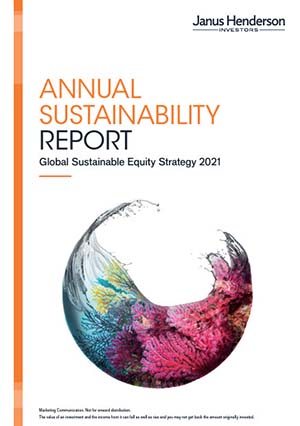Introducing the Global Sustainable Equity annual report
Amarachi Seery and Harry Schmidt, Global Sustainable Equity analysts, introduce the team's fourth Annual Sustainability Report.
1 minute watch
Key takeaways:
- The strategy exceeded the MSCI World benchmark in 2021 in all but one of its environmental, social and governance (ESG) metrics.
- Over 20% of holdings have either already achieved, intend to achieve, or are being engaged with to achieve net zero by 2030.
- Looking ahead, the team will seek to increase engagement on climate, reporting, and diversity and inclusion.
Sustainability article
Global sustainability
We are delighted to share with you the Global Sustainable Equity Strategy’s annual sustainability report for 2021, our fourth version of this report in the strategy’s history. This is the most detailed version of the report that we have ever produced, and we are proud of the significant steps we have taken to enhance transparency for our stakeholders.
As sustainable investors, transparency is vital. Reporting allows us to communicate our sustainability performance, enhancing our accountability to stakeholders. In short, this report demonstrates that we are who we say we are and that we do what we say we do.
So, what can you find in the 2021 Annual Sustainability Report for the Global Sustainable Equity Strategy?
The first few pages of the report highlight the strategy’s investment approach, gives a good summary of the strategy’s thematic allocation, and provide some case studies based on a few companies we invest in.
As you delve deeper, you will find a comprehensive evaluation of the strategy’s performance against a number of ESG metrics and an update to our Task Force on Climate-Related Financial Disclosures reporting. We are pleased to report improvements in many of these metrics compared to the year prior.
We also include a detailed summary of voting and engagement with examples of key engagement topics addressed throughout the year.
We finish off by explaining how the strategy contributes to the United Nations Sustainable Development Goals. These areas will go on to influence many of the engagement points with companies in the coming 12 months.
We would encourage you to read the full version of the Annual Sustainability Report, which can be found on the Janus Henderson website.
If you have any questions or would like to discuss any of these topics in more detail, please reach out to the Global Sustainable Equity Team.
We hope you find the report informative and look forward to hearing your feedback.
These are the views of the author at the time of publication and may differ from the views of other individuals/teams at Janus Henderson Investors. References made to individual securities do not constitute a recommendation to buy, sell or hold any security, investment strategy or market sector, and should not be assumed to be profitable. Janus Henderson Investors, its affiliated advisor, or its employees, may have a position in the securities mentioned.
Past performance does not predict future returns. The value of an investment and the income from it can fall as well as rise and you may not get back the amount originally invested.
The information in this article does not qualify as an investment recommendation.
Marketing Communication.
Important information
Please read the following important information regarding funds related to this article.
- Shares/Units can lose value rapidly, and typically involve higher risks than bonds or money market instruments. The value of your investment may fall as a result.
- Shares of small and mid-size companies can be more volatile than shares of larger companies, and at times it may be difficult to value or to sell shares at desired times and prices, increasing the risk of losses.
- If a Fund has a high exposure to a particular country or geographical region it carries a higher level of risk than a Fund which is more broadly diversified.
- This Fund may have a particularly concentrated portfolio relative to its investment universe or other funds in its sector. An adverse event impacting even a small number of holdings could create significant volatility or losses for the Fund.
- The Fund follows a sustainable investment approach, which may cause it to be overweight and/or underweight in certain sectors and thus perform differently than funds that have a similar objective but which do not integrate sustainable investment criteria when selecting securities.
- The Fund may use derivatives with the aim of reducing risk or managing the portfolio more efficiently. However this introduces other risks, in particular, that a derivative counterparty may not meet its contractual obligations.
- If the Fund holds assets in currencies other than the base currency of the Fund, or you invest in a share/unit class of a different currency to the Fund (unless hedged, i.e. mitigated by taking an offsetting position in a related security), the value of your investment may be impacted by changes in exchange rates.
- When the Fund, or a share/unit class, seeks to mitigate exchange rate movements of a currency relative to the base currency (hedge), the hedging strategy itself may positively or negatively impact the value of the Fund due to differences in short-term interest rates between the currencies.
- Securities within the Fund could become hard to value or to sell at a desired time and price, especially in extreme market conditions when asset prices may be falling, increasing the risk of investment losses.
- The Fund could lose money if a counterparty with which the Fund trades becomes unwilling or unable to meet its obligations, or as a result of failure or delay in operational processes or the failure of a third party provider.
Specific risks
- Shares/Units can lose value rapidly, and typically involve higher risks than bonds or money market instruments. The value of your investment may fall as a result.
- Shares of small and mid-size companies can be more volatile than shares of larger companies, and at times it may be difficult to value or to sell shares at desired times and prices, increasing the risk of losses.
- The Fund follows a sustainable investment approach, which may cause it to be overweight and/or underweight in certain sectors and thus perform differently than funds that have a similar objective but which do not integrate sustainable investment criteria when selecting securities.
- The Fund may use derivatives with the aim of reducing risk or managing the portfolio more efficiently. However this introduces other risks, in particular, that a derivative counterparty may not meet its contractual obligations.
- If the Fund holds assets in currencies other than the base currency of the Fund, or you invest in a share/unit class of a different currency to the Fund (unless hedged, i.e. mitigated by taking an offsetting position in a related security), the value of your investment may be impacted by changes in exchange rates.
- When the Fund, or a share/unit class, seeks to mitigate exchange rate movements of a currency relative to the base currency (hedge), the hedging strategy itself may positively or negatively impact the value of the Fund due to differences in short-term interest rates between the currencies.
- Securities within the Fund could become hard to value or to sell at a desired time and price, especially in extreme market conditions when asset prices may be falling, increasing the risk of investment losses.
- The Fund could lose money if a counterparty with which the Fund trades becomes unwilling or unable to meet its obligations, or as a result of failure or delay in operational processes or the failure of a third party provider.
- In respect of the equities portfolio within the Fund, this follows a value investment style that creates a bias towards certain types of companies. This may result in the Fund significantly underperforming or outperforming the wider market.




